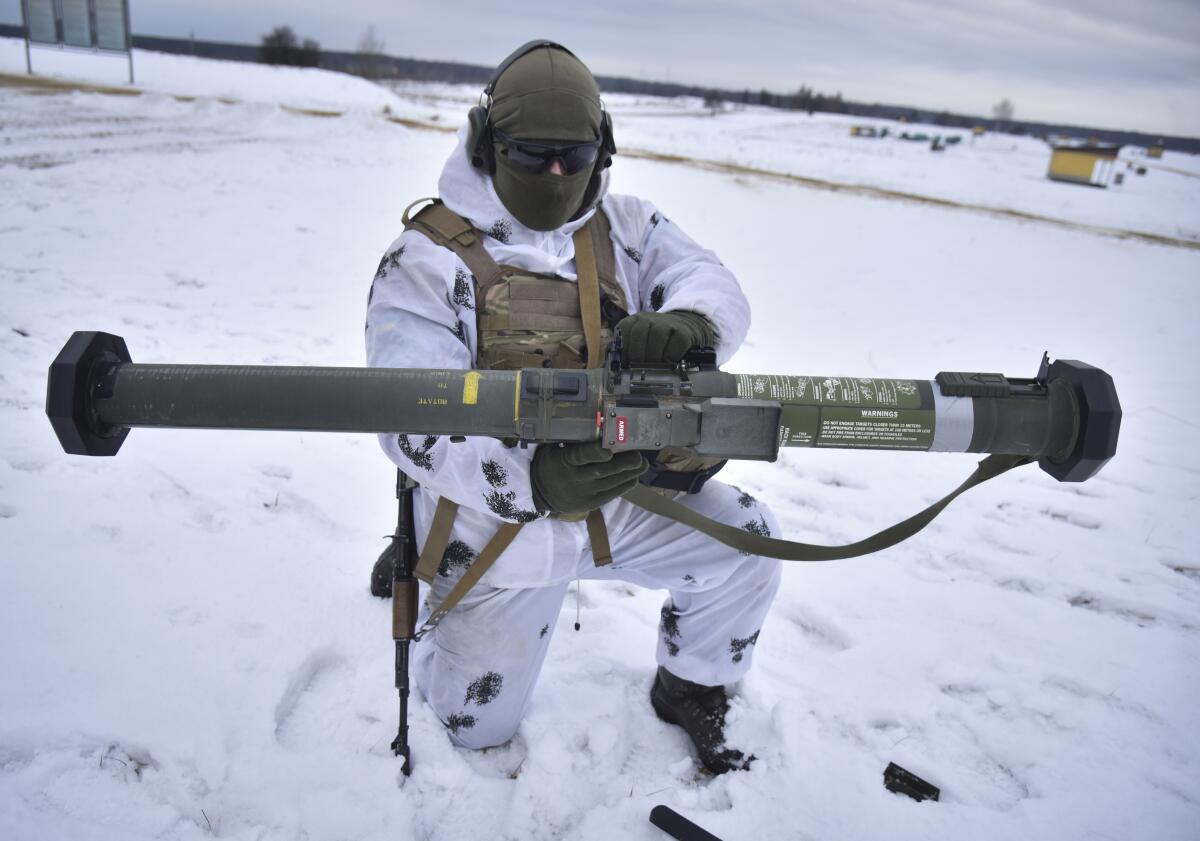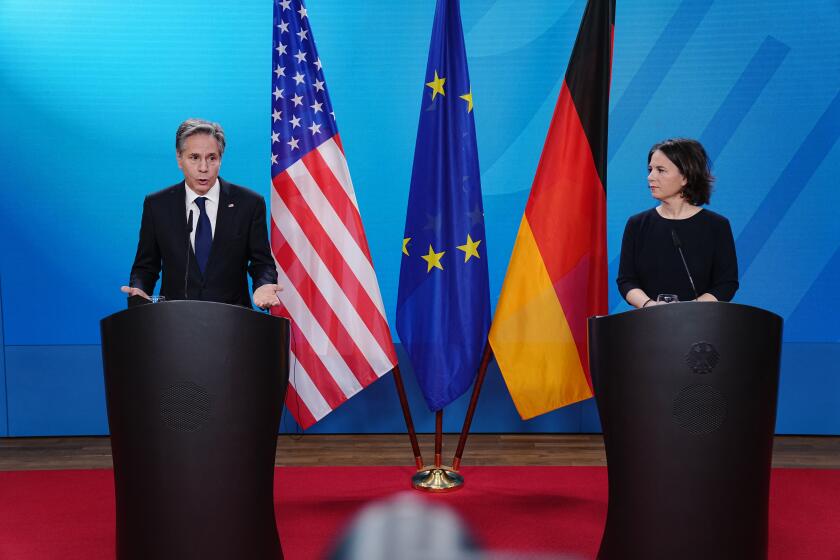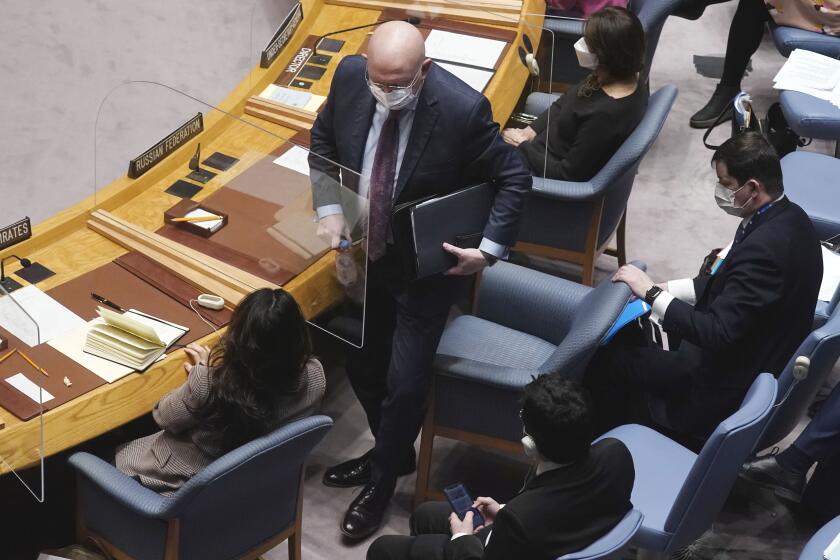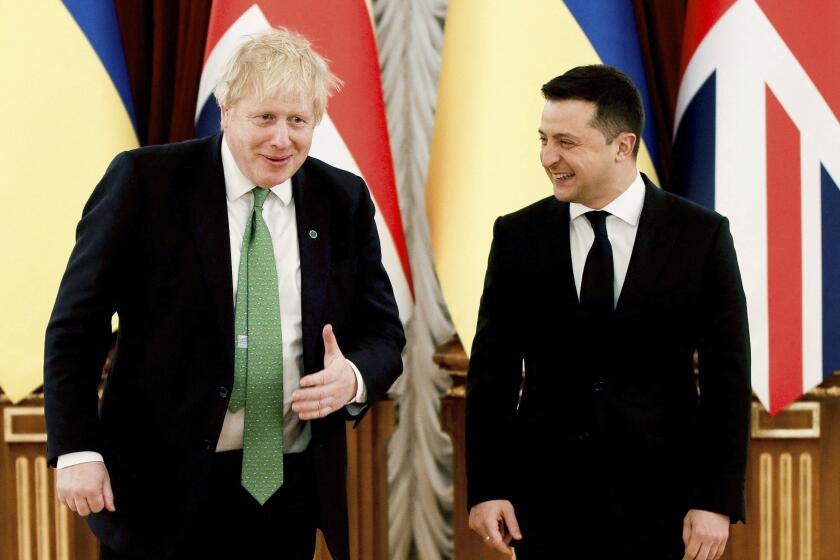Leaders of France, Germany to visit Russia and Ukraine in bid to ease tensions

- Share via
PARIS — The French president and the German chancellor will head to Moscow and Kyiv in the coming weeks, adding to diplomatic efforts to deter Russian President Vladimir Putin from launching an invasion of Ukraine and to find a way out of the growing tensions.
France’s Emmanuel Macron is scheduled to visit Moscow on Monday and Kyiv on Tuesday, while Germany’s Olaf Scholz will travel to Kyiv on Feb. 14 and Moscow on Feb. 15.
The high-level visits come as China has backed Russia’s demand that NATO be kept from expanding to include Ukraine, and after the U.S. accused the Kremlin on Thursday of an elaborate plot to fabricate an attack by Ukrainian forces for use as a pretext for military action. The U.S. has not provided detailed information backing up the claims, which Moscow has vehemently denied.
While France is a major player in NATO and is moving troops to Romania as part of the alliance’s preparation for possible Russian action, Macron has also been pushing for dialogue with Putin and has spoken to him several times in recent weeks. The two will hold a one-on-one meeting Monday, Macron’s office said Friday.
Macron is following a French tradition of striking a separate path from the U.S. in geopolitics, as well as trying to make his own mark on this crisis and defend Europe’s interests.
Germany has emphasized the importance of various diplomatic tools to defuse the tensions and has refused to send weapons to Ukraine, irking some allies. Scholz also has faced criticism at home lately for keeping a low public profile in the crisis.
As the U.S. seeks to present a united front on Ukraine, Germany has its own interests to safeguard in dealings with the Kremlin. Some other European states do as well.
But weeks of talks have led to no major concessions by Russia or the U.S., making it unclear how much effect his and Macron’s visits will have. But Ukraine’s Foreign Minister Dmytro Kuleba said Friday that “top-level visits seriously reduce challenges in the sphere of security and upset the Kremlin’s plans.”
Macron filled in President Bidenon his diplomatic efforts in a call Wednesday. In talks with the Russian and Ukrainian leaders Thursday night, Macron’s office said they discussed ways to “identify elements that could lead to de-escalation” and “conditions for strategic balance in Europe, which should allow for the reduction of risks on the ground and guarantee security on the continent.”
Scholz has a previously planned meeting with Biden in Washington on Monday.
Moscow has been signaling an apparent readiness for more talks with Washington and NATO in recent days. Some experts say that as long as Russia and the West keep talking, that’s a reason for cautious optimism.
Russia and the U.S. trade accusations over Ukraine at the United Nations Security Council. Moscow’s U.N. ambassador accuses Biden administration of “hysterics” before he walks out.
Russia has massed more than 100,000 troops near Ukraine’s northern and eastern borders, raising concern that Moscow might invade again, as it did in 2014. The troop presence and uncertainty have unnerved many Ukrainians and hurt the country’s economy.
The Kremlin has denied that an invasion is planned and has demanded guarantees from the West that Ukraine will never join NATO, that deployment of NATO weapons near Russian borders will be halted and that the alliance’s forces will be rolled back from Eastern Europe.
China on Friday lent its support to the demands after Putin met with Chinese President Xi Jingping in Beijing before the opening of the Winter Olympics. After the talks, the two leaders issued an elaborate joint statement, declaring their opposition to any expansion of NATO.
“The Chinese side is sympathetic to and supports the proposals put forward by the Russian Federation to create long-term legally binding security guarantees in Europe,” the statement read.
Putin says the U.S. and its allies have ignored Russia’s top security demands but added he’s still open for more talks with the West.
Turkish President Recep Tayyip Erdogan has also offered to mediate talks between Russia and Ukraine. Erdogan, whose country is a NATO member, visited Kyiv this week and upon returning to Turkey contended that Western leaders have failed to make a positive contribution toward the resolution of tensions between Russia and Ukraine.
Erdogan also said that Ukrainian President Volodomyr Zelensky strongly supports a Turkish proposal for mediation to reduce tensions between the two nations.
“Unfortunately, the West has not contributed anything toward a solution of this issue,” Erdogan said. “They are just creating obstacles.”
Meanwhile in Washington, U.S. officials said a plan for a fake attack on Russian territory or Russian-speaking people was described in declassified intelligence shared with Ukrainian officials and European allies in recent days. It was the latest example of the Biden administration divulging intelligence findings as a tactic to stop Russian disinformation efforts and foil what it says is Putin’s attempt to lay the groundwork for military action.
Russian officials have rejected the allegations. Foreign Minister Sergey Lavrov on Friday spoke of the “absurdity” of the claims, and Kremlin spokesman Dmitry Peskov told reporters “not to take anyone’s word for it, especially the State Department’s, when it comes to these issues.”
In recent weeks, the White House has said that U.S. intelligence shows Russia has launched a malignant social media disinformation campaign against Ukraine and has dispatched operatives trained in explosives to carry out acts of sabotage against Russia’s own proxy forces.
Britain has said it has intelligence showing Russia is plotting to install a pro-Russian puppet government in Kyiv.
More to Read
Sign up for Essential California
The most important California stories and recommendations in your inbox every morning.
You may occasionally receive promotional content from the Los Angeles Times.













